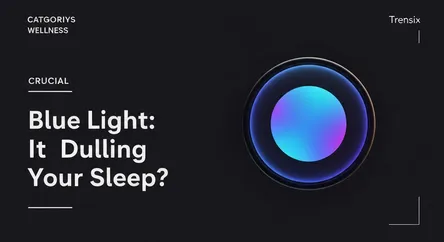Wellness
Blue Light: Is It Dulling Your Sleep?

Discover how blue light from your screens impacts your natural sleep cycle and what it means for your nightly rest and overall wellness.
What is it?
Blue light is a high-energy, short-wavelength light within the visible light spectrum. The sun is the main natural source, but we get significant exposure from artificial sources like LED lights and the digital screens on our smartphones, computers, and televisions. This type of light is particularly impactful on our body's internal clock, which regulates our daily cycles of sleep and wakefulness.
Why is it trending?
The topic is trending due to the massive increase in screen time in modern life, with many people using electronic devices right up until bedtime. As wellness and "sleep hygiene" become mainstream priorities, the negative effect of blue light on sleep quality is a major concern. This has driven interest in solutions like night-mode settings on devices, blue light-blocking glasses, and reducing screen use before bed to improve rest.
How does it affect people?
Exposure to blue light in the evening disrupts our natural sleep-wake cycle, known as the circadian rhythm. It tricks the brain into suppressing the production of melatonin, a key hormone that tells your body it's time to sleep. This delay can make it more difficult to fall asleep, decrease sleep quality, and result in feeling unrested the next day. Chronic exposure can also lead to digital eye strain and has been linked to other negative health impacts.